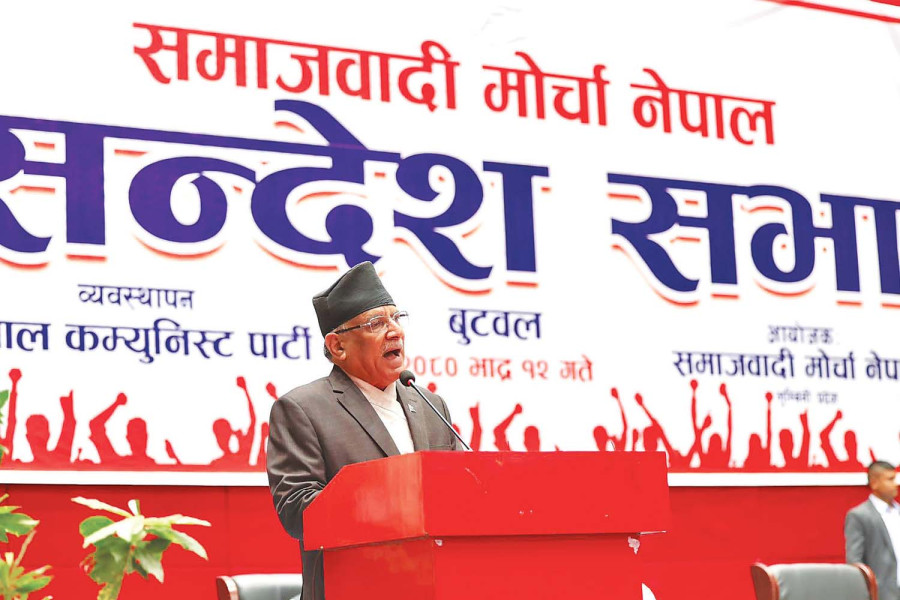Politics
PM painting rosy picture while public frustration grows
The government is trying to show a tough stance against corruption, but lawmakers question Dahal’s intent.
Tika R Pradhan
At a time public frustration is growing, thousands of youths are leaving the country every day and market anomalies are causing people great hardship, Pushpa Kamal Dahal is boasting of his achievements since becoming prime minister eight months ago.
He claims his third stint as the head of government is clearly different from his previous two terms.
Dahal has been repeating a list of his government’s initiatives as achievements in every public forum he has addressed in the past few days.
He reiterated the same at a gathering organised by the Socialist Front in Surkhet on Thursday. The front comprising four political parties—the CPN (Maoist Centre) led by Dahal, the Janata Samajbadi Party, the CPN (Unified Socialist), and the Communist Party of Nepal—has been organising such public gatherings in each province.
“There used to be long queues to get passports and that had caused hassles for youths in all 77 districts,” the prime minister said in Surkhet on Thursday. The situation has eased, he added.
He even claimed that rival forces were jealous of the progress made by his government in recent months.
“We took the initiative to enlist in the Social Security Fund hundreds of thousands of migrants working in various countries. Now around 350,000 Nepali migrant workers have joined the fund,” he said. “This is intolerable for the reactionaries and feudal elements.”
Dahal also termed several agreements and understandings reached with New Delhi during his recent India visit as ‘historic’. From the agreement to take the Pancheshwar hydro project ahead to the understanding on energy trade between Nepal and India and also with Bangladesh, were things Nepalis aspired for years, he said.
“The commitment from the Indian prime minister to resolve the border issue is as important,” Dahal said. “There was a celebration at the people’s level but the rivals tried to portray that all I had been able to secure from India were some buffaloes.”
Before Dahal wrapped his India visit in early June, the southern neighbour agreed to release 15 buffalo bulls that would be used for improving the breed in Nepal.
While claiming credit for the recent initiatives in investigating fake Bhutanese refugee scam, Lalita Niwas land grab and gold smuggling issues, Dahal said he had allowed the police to probe the issues independently.
Refuting allegations that the government had directed investigating officers to selectively prosecute the suspects, he claimed that he had even asked the officers to arrest Prachanda [himself] if he was in any way connected to an act of corruption.
He presented pretty much the same list of government initiatives while answering the questions of lawmakers in the meeting of the House of Representatives earlier on Tuesday.
“There is a narrative that all leaders are bad and people’s frustration towards the political system is growing and the government is working hard to prove that narrative wrong,” Prime Minister Dahal told the House responding to a query from lawmakers.
Answering a query of Rastriya Swatantra Party lawmaker Ashim Shah, Dahal said “people have realised that good governance is possible after witnessing independent investigations going on into various scams.”
Shah asked Dahal how could people expect good governance from a prime minister who is trying to protect “only the yes men”.
To show how the government was failing on every front, Shah also gave a list of scenarios such as emptying universities, the wave of youths including sportspersons leaving the country.
He also questioned the prime minister’s intent on the transfer of key police officers involved in recent high profile scams.
Eleven lawmakers from different political parties raised similar questions to the prime minister during the question-answer session of the House of Representatives on the day.
Some were visibly unsatisfied by the prime minister’s generic answers to their questions.
“Actually, it was like match-fixing—we read out our questions sent on Friday and the prime minister recited the answers prepared by his secretariat staff,” said Shah, the RSP lawmaker. “In his answer the prime minister claimed to have allowed police to arrest even himself but in practice, he is transferring police officers to influence the ongoing probe.”
The question-answer session was included in the parliamentary regulations to make the head of government answer lawmakers’ questions with specific details. But the lawmakers were not happy with the way the prime minister was casually responding to their questions.
Political analysts said the prime minister is forced to walk a tightrope as he is leading a government with the support of many parties and his hands are often tied.
“People’s expectations and demands are for drastic change but the prime minister has to serve the interests of his coalition partners,” said Krishna Pokhrel, a professor of political science. “Though the prime minister seems to be trying to do something to curb rampant corruption, he has not been able to work as expected.”
Dahal’s claim of improved governance comes at a time when people in general are suffering from rising prices of fuel and other essential goods.
Food inflation in Nepal is already above the double-digit figure, according to the central bank’s latest report. A further rise may impact millions of Nepalis who spend more than 80 percent of their income on consumption. On Thursday, Nepal Oil Corporation increased the price of cooking gas by Rs235 per cylinder.
Pokhrel said the prime minister is controlled not only by his own party but also other coalition partners. “Bhutanese refugees case seems to attract top leaders of the first party while Lalita Niwas case connects with the interests of another party.”




 14.12°C Kathmandu
14.12°C Kathmandu














